Demystifying Executive Coaching Costs: What You Need to Know
Executive coaching has become an essential tool for professional development in today's competitive business landscape. As executives seek to enhance their leadership skills and navigate complex challenges, the demand for executive coaching services has surged. However, one question that often arises is the cost associated with executive coaching. In this comprehensive guide, we'll delve into the intricacies of executive coaching cost to provide clarity and insights for both executives and organizations.
Understanding Executive Coaching Fees:
Executive coaching fees can vary significantly depending on various factors such as the coach's experience, credentials, coaching methodology, and the specific needs of the client. Typically, executive coaching services are priced either on an hourly basis or through package deals.
Executive Coaching Cost Per Hour:
One of the common pricing models for executive coaching is charging by the hour. According to industry standards, executive coaching cost per hour can range from $200 to $600 or more. This wide range reflects the diversity in coaches' expertise and the level of customization required for each client.
Factors Influencing Executive Coaching Rates:
Several factors influence executive coaching rates, including:
Coach's Experience and Credentials: Coaches with extensive experience and specialized certifications often command higher fees.
Scope of Services: The complexity and depth of the coaching engagement can impact the overall cost.
Coaching Methodology: Coaches who use proprietary methodologies or incorporate additional resources may charge higher rates.
Duration of Engagement: Longer coaching engagements may offer economies of scale, resulting in lower hourly rates.
Client's Goals and Expectations: Tailoring coaching services to meet specific client objectives may affect pricing.
Navigating Executive Coaching Costs:
While the cost of executive coaching may seem daunting, it's essential to consider it as an investment in personal and professional growth. When evaluating coaching options, executives and organizations should prioritize quality, fit, and the potential return on investment.
While it's natural to consider the financial aspect of any investment, focusing solely on executive coaching cost may overshadow the invaluable benefits it can bring to your personal and professional growth. Instead, it's essential to shift the perspective towards the value addition that executive coaching offers. By investing in executive coaching, individuals gain access to tailored guidance, mentorship, and strategies for overcoming obstacles and maximizing their potential.
Also Read: Your Ultimate Guide for Purposeful Travel
The insights gained from coaching sessions can lead to enhanced leadership skills, improved decision-making, increased self-awareness, and greater overall effectiveness in the workplace. Moreover, the long-term impact of executive coaching extends beyond immediate results, influencing career trajectory, job satisfaction, and organizational success. Therefore, rather than fixating on the upfront expense, consider the long-term value and transformative impact that executive coaching can provide.
FAQs:
Are executive coaching fees tax-deductible?
In many cases, executive coaching fees are considered a business expense and may be tax-deductible. However, it's advisable to consult with a tax professional to understand the specific regulations in your jurisdiction.
How long does an executive coaching engagement typically last?
The duration of an executive coaching engagement can vary based on the client's goals and needs. While some engagements may span a few months, others could extend over a year or more for ongoing support and development.
Can executive coaching be conducted virtually?
Yes, with advancements in technology, many executive coaching sessions are conducted virtually via video conferencing platforms. Virtual coaching offers flexibility and accessibility for busy executives regardless of their location.
Conclusion:
Investing in executive coaching can yield significant benefits for both individuals and organizations, but understanding the cost implications is crucial for making informed decisions. By considering factors such as executive coaching rates and the value proposition offered by experienced coaches, executives can embark on a transformative journey towards achieving their professional goals.

